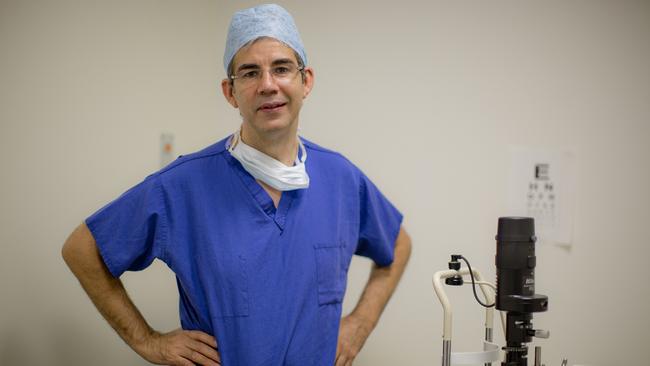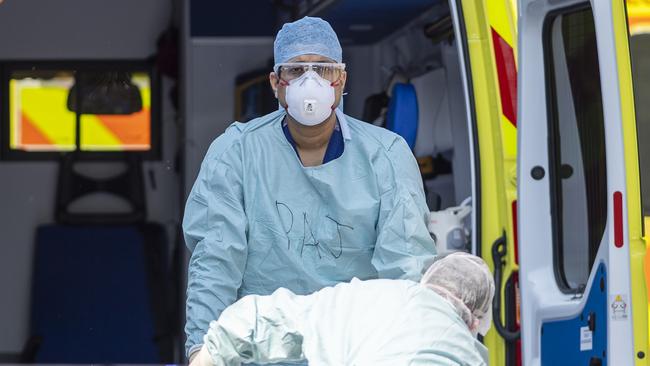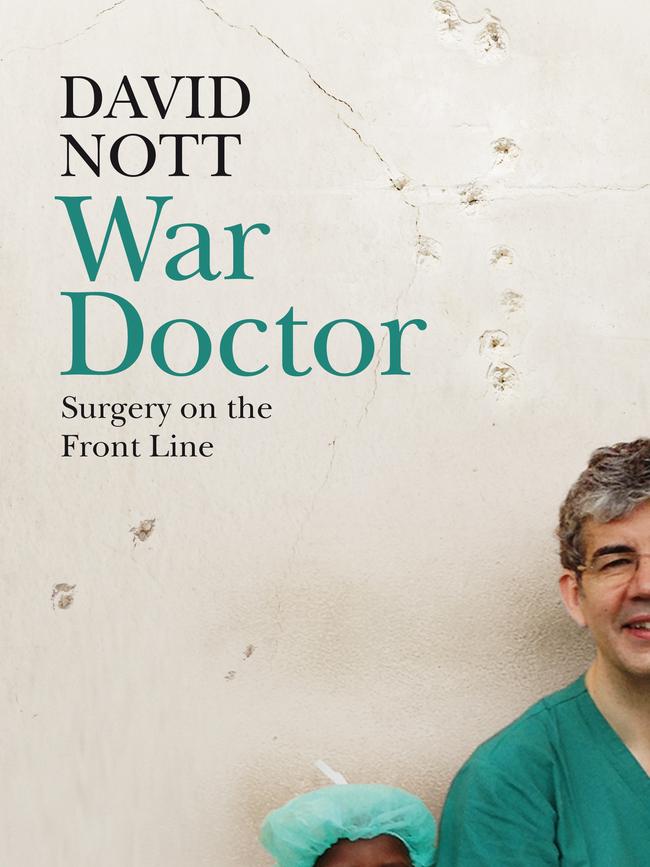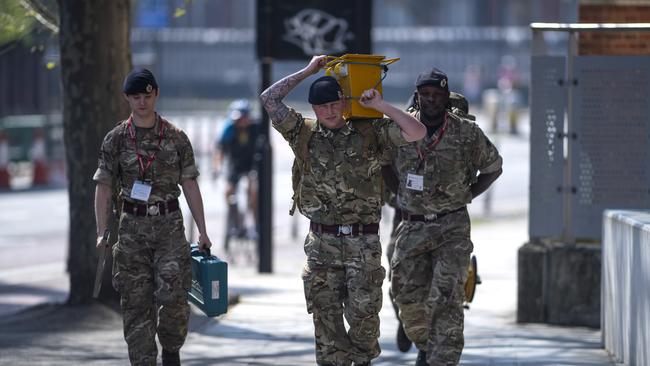Coronavirus: ‘I’ve operated in Syria. This is worse’
World-renowned trauma surgeon David Nott is fighting coronavirus in London — and his tales from the frontline are grim.

He is a world-renowned trauma surgeon who has worked in some of the most dangerous war zones on earth. Just 10 weeks ago he was operating in Yemen, where more than 100,000 people have been killed in the past five years. Now Dr David Nott finds himself on front lines a 25-minute bike ride from home, fighting the coronavirus in a London hospital, describing it as “the most frightening enemy” he has faced.
“Never in a million years did I imagine I’d see something like this in London,” he says, at the end of an exhausting 10-hour shift. “I don’t know how to describe it - it’s a very strange place to be.”
Nott is working on the ninth floor of St Mary’s Hospital, Paddington, in an operating theatre recovery suite that has been converted to an intensive care unit for 25 Covid-19 patients, all on ventilators.

“Like most surgeons, I’ve never worked on an ICU,” he said. “But now it’s needs must. It’s a massive learning curve.”
The experience has left him in awe of colleagues, particularly the nurses.
“I’m a tiny, tiny cog in this most amazing machine,” he said. “The real heroes are the nurses. To be with patients so seriously sick for 13 hours a day, wearing masks on their face which cause so much discomfort. I have never seen people work so hard, so desperate for each individual patient to get through their sickness. But sometimes the disease wins.”
Working on the unit has brought home what a lottery that is - last week they lost an apparently fit young man of 25.
“A lot of people we have on our unit are quite young, in their twenties, thirties, forties and fifties,” he said. “Why some have a mild illness and others have huge problems and go down really rapidly, even though they have no underlying conditions and are completely fit and well, is a mystery nobody understands.”
When patients arrive at the hospital suffering breathlessness, they are first given an oxygen mask. “If that doesn’t work, they go on a CPap - a continuous positive airway pressure device, like a bag placed on the face, where every time they take a deep breath in, oxygen is forced into their lungs to keep the small alveoli, or air sacs, open. If that doesn’t work, they go on ventilators.”
To help maximise air intake, patients are turned onto their front by physiotherapists and what’s called a proning team of six or eight people. “The problem is patients get very, very tired,” he says. “A lot of old people are succumbing to this because the effort of breathing is so great they can’t breathe any more.”

Many have compared the current situation to war, something Nott knows well after 25 years of leaving his National Health Service job every year to spend his holidays as a volunteer in war zones from Afghanistan to Syria. “In a war zone there’s this feeling, even though I am treating all these people with bullet wounds, I won’t be the one it happens to,” he says. “In the same way, when we first heard about Wuhan, we didn’t think it would happen to us.
“In war you can be targeted any moment, shot at or bombed, but here it’s an invisible enemy. It’s the hardest, most dangerous enemy I have ever faced.”
There are particular risks for health workers. At least 19 doctors and nurses have died, giving Nott the same fear in the pit of his stomach that he had in war zones, contemplating being kidnapped. “You do not know if you are going to catch it and do not know if you will have a mild response or massive response that ends up with your lungs so battered nothing can save you.
“That’s the issue all of us worry about when we go to work. The longer you’re there, the more chance of getting it.
“We all wear protective equipment because it’s an airborne virus that can come out of people’s mouths and go on your clothes or anywhere. The most dangerous part is taking the PPE off, because if you get a slight amount of anything into your face or mouth or eyes, you are probably going to get it.
“All of us feel anxious going to work. Everyone tries to makes light of it and everyone is in it together, just like in war, when you go through such intense experience, you become a band of brothers.”
Nott is so concerned for his family that he has sent his wife and two small daughters away. “When this started to look so bleak, Elly and I decided it would be best to live under separate roofs. I would be going to a hotbed of Covid, day in, day out and they would be sitting ducks for anything I brought back. I miss them so much but many of my medical colleagues have taken similar difficult decisions.”

His younger daughter, Elizabeth, had her third birthday on Friday. Nott missed it and fears he will also miss his daughter Molly’s fifth birthday in July. “It’s hard being away from them. It’s similar to the Second World War with evacuees leaving their families.”
Because of his war experience, Nott was asked by the Intensive Care Society to make a video for those working on coronavirus wards. “The idea was to try to let people know what it’s like to be in a dreadful situation where things are happening you’ve never seen before and decisions made you will never have made before on which patients can live or die.”
The mental toll, he fears, will be enormous. “There will be thousands of cases of PTSD [post-traumatic stress disorder] among the NHS people involved because death is all around us, all the time. Hundreds of people are dying every day. Junior medical and nursing staff will have seen things that are emotionally destroying and we need to be ready to help them.
“In a war zone you get through it day by day,” he adds. “It’s when you come home and sit there and realise what you have just been through it suddenly hits you and you can become extremely depressed.”
Nott describes himself as “an old warrior” but was so devastated by his experiences in Aleppo, where Syrian children were maimed by barrel bombs dropped by the Assad regime and hospitals targeted, that when he was invited to lunch by the Queen and she asked him how it was, he found himself unable to speak. “She touched my hand, then opened a silver box full of biscuits,” he recalled. “’These are for the dogs,’ she said, breaking one of the biscuits in two and giving me half. Together, we fed the corgis. ‘There,’ the Queen said. ‘That’s so much better than talking, isn’t it?’”
He says what he is seeing now is as bad. “It’s comparable to seeing all those children blown up in Aleppo.”
Just as Nott has to do in war zones, British medical staff are having to make difficult choices about who gets treated.
“Triage in war is really important,” he says, “to know which patients can live, which are futile to operate on. I look at the amount of equipment I have, the amount of blood I have. In the same way, the hospital has a Covid response team who assess the morbidity of each patient, how old they are, do they have underlying problems . . . I never imagined seeing this in the UK.” The battle against the coronavirus is so all-consuming that it is changing the way surgery is carried out.
“It’s very much war-type surgery, more like damage control,” he says. “We’ve stopped doing laparoscopic [keyhole] surgery, where you put in carbon dioxide and blow up the tummy, because of the risk of the virus going into the gas and you inhaling it. We’ve gone back to straightforward operating using a knife.
“We’re not doing any elective work; it’s all emergency. So if someone comes in with a perforated bowel or an obstructed cancer and they could have Covid, they are on the operating table for a very short time, and we fit colostomies to relieve the obstruction, rather than spending six or seven hours to remove the tumour.”
He fears other patients are being forgotten. “The big worry is there will be a second blip of morbidity of patients whose problems have been left three or four months.”
Two weeks ago he met Sir Mark Sedwill, the cabinet secretary, to discuss creating Covid-negative hubs where routine operations and treatment could go ahead. “We all know how bad the virus is,” Nott says, “but there is also that huge group of patients who filled up all our NHS hospitals before this virus and we mustn’t forget about them.”
He also worries about countries with health systems destroyed by war - such as Yemen, which reported its first case on Friday. Nott was there in late January training doctors, as he does in conflict zones round the world. He launched a foundation that has trained 803 doctors and often gets Skype calls to talk them through operations. Last week one called from a refugee camp in Idlib, Syria, with a 19-year-old needing a caesarean section because of an obstructed pregnancy.
“The doctor had never before done one. Fortunately we managed to get her across the border to an American field hospital and mother and baby survived, but it was a close-run thing.”
He is particularly worried about Idlib, which has three million people and only 300 doctors, with many of its hospitals bombed. Nott also fears for the world’s 70 million refugees. “They live in unhygienic places, sometimes 15 families in one tent, they have no running water or alcohol gel, so I am really scared that if we get over this pandemic in Europe in the next three months or so, there might then be a second peak after that among refugees, which will be catastrophic.”
Yet there has been one unexpected positive. Fighting has stopped in Yemen, as has the bombing in Idlib.
“Hopefully this crisis will reset minds so people realise the human race is one big family and we should help each other as we are doing here and stop killing each other. We’re only on this planet once, we’re all in it together and any of us can go down at any time.”
For his part, he lives almost a monastic existence. “I go from hospital directly to home and directly upstairs to shower and wash all my clothes. I don’t meet anyone or discuss anything with anyone except on the phone.”
Yet, even as his hospital started transferring patients to London’s new Nightingale Hospital on Thursday in preparation for an expected escalation in the coming days, he is furious that some still do not seem to realise how serious things are.
“I cycle to work and back and see so many people out and not respecting what the government is saying and it makes me really angry. If they went to work as I do every day and saw how catastrophic it really is, they would stay at home.”



To join the conversation, please log in. Don't have an account? Register
Join the conversation, you are commenting as Logout